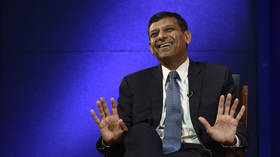India’s central bank reveals growth prediction

In line with experts’ projections, Reserve Bank of India (RBI) Governor Shaktikanta Das affirmed on Friday that the crucial policy repo rate would be maintained at 6.5% as the economy is showing signs of robust economic expansion and persistent inflation.
Announcing the unaltered repo rate for the seventh consecutive session, the RBI governor also revealed the central bank’s projection of 7% GDP growth for the 2024-25 financial year, which started on April 1. In addition, according to the RBI, retail inflation is projected at 4.5%.
“Two years ago, around this time, when CPI inflation had peaked at 7.8% in April 2022, the elephant in the room was inflation. The elephant has now gone out for a walk and appears to be returning to the forest,” said Das. The key lending rate was raised by a total of 250 basis points between May 2022 and February 2023.
The central bank is cautious about prematurely easing its stance on inflation and its primary focus remains on steadily reducing inflation to reach the medium-term target of 4%.
India recorded 8.4% GDP growth in the third quarter of 2023-24 financial year (October to December), up from growth of 7.6% in the June to September period. Commenting on the achievement in February, Indian Prime Minister Narendra Modi said that the government’s efforts would continue “to bring fast economic growth” to help 1.4 billion people “lead a better life.” New Delhi has recently raised its GDP growth outlook for 2023-24 fiscal year from 7.3% to 7.6%.
Commenting on the latest GDP data, International Monetary Fund (IMF) executive director Krishnamurthy Subramanian said India is “easily the fastest-growing economy in the world.” The IMF expects India’s economy to expand by 6.7% for the 2024 financial year that ended in March, and by 6.5% for the same period in 2025.
Last week, former governor of RBI Raghuram Rajan, who also worked at IMF, suggested in the interview with Bloomberg that India is making a mistake by believing in the “hype” around its strong economic growth and that the country needs to improve its structural problems, including poor education and skills of the workforce, to meet its true potential. Rajan said India cannot become a developed economy by 2047 – the year the country will celebrate 100 years of its independence – something that the Modi-led government has been aiming at.
However, he was immediately criticized by other economists and officials. Mohandas Pai, former CFO of tech giant Infosys and now the chairperson of Manipal Global Education, described Rajan’s arguments as “silly”, citing India’s progress in education and job creation. Arvind Virmani, member of government policy think tank NITI Aayog, said that Rajan was sounding like “parachute economists” who are cut off from the ground realities.
Where India Meets Russia – We are now on WhatsApp! Follow and share RT India in English and in Hindi













